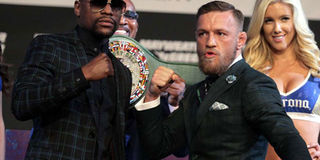Mayweather v McGregor: Past v future?

Boxer Floyd Mayweather Jr. (left) and MMA fighter Connor Mcgregor pose during a media press conference August 23, 2017 at the MGM Grand in Las Vegas, Nevada. PHOTO | JOHN GURZINSKI |
What you need to know:
- The UFC is now spreading its influence across the globe, regularly holding events in Asia and Australia while broadcasting to more than 150 countries.
- Saturday's superfight will be broadcast in at least 200 countries and territories, according to Showtime television executive Stephen Espinoza.
LAS VEGAS
For fans of mixed martial arts, Floyd Mayweather and Conor McGregor's superfight represents a battle between the past and future of combat sports.
The powerful economic forces that made Saturday's bout inevitable are testimony to the remarkable rise of the Ultimate Fighting Championship at a time when boxing has faced a steady decline.
Boxing has more than a century of history to fall back on, a rich heritage of pugilistic endeavour with a cast of iconic names such as Jack Johnson, Muhammad Ali and Joe Louis to name but a few.
But if boxing was reinvented today, there's every chance its business model would mirror the strategy that has seen the UFC go from niche sport to money-spinning monster inside of two decades.
Boxing's struggle to maintain a foothold in the mainstream can be attributed to its gradual fragmentation since its post-war golden age, when there were only eight world champions from flyweight to heavyweight.
Today casual boxing fans are asked to make sense of an alphabet soup of four different sanctioning bodies governing 17 different weight classes, which mean that theoretically there could be as many as 68 world champions at any one time.
By contrast, the UFC, universally regarded as the pre-eminent mixed martial arts body, enjoys monopoly control of its sport.
Eight divisions, eight world champions and the freedom to make the fights that its audience wants to see have given the UFC's owners the ability to create rivalries and narratives that are instantly recognisable.
"The way I've built this business, the model I've used is the exact opposite of everything boxing has done over the last 20-25 years," Dana White, the UFC's chief executive told AFP in an interview.
The growing prominence of UFC is best reflected in its steady growth of pay-per-view television buys over the past 15 years.
Boxing continues to hold the biggest records for pay-per-view events — with a mammoth 4.6 million people purchasing Mayweather's fight with Manny Pacquiao in 2015.
But the UFC has put on events generating over one million sales with increasing frequency since 2010, suggesting a closing of the gap.
In 2016, UFC staged five events which broke the one million pay-per-view barrier; boxing had none.
Those kinds of numbers explain why a consortium led by talent agency WME-IMG last year paid a staggering $4 billion for the UFC, just 15 years after casino operators Lorenzo and Frank Fertitta paid $2 million to own the sport.
GLOBAL INFLUENCE
The UFC is now spreading its influence across the globe, regularly holding events in Asia and Australia while broadcasting to more than 150 countries.
Saturday's superfight will be broadcast in at least 200 countries and territories, according to Showtime television executive Stephen Espinoza.
Espinoza however challenges the view that a victory for the UFC's standard-bearer, McGregor, will be seen as a damaging blow for boxing.
"It will be taken by the UFC's fans as a victory over boxing, a sign that their sport is the superior sport, that it is the future of sports entertainment," Espinoza said. "But they have been proclaiming for the past 15 years that boxing is dead. And it is not true."
Conversely, UFC chief executive White rejects suggestions that an emphatic win by Mayweather over McGregor could somehow reflect negatively on mixed martial arts.
"Absolutely not," White said recently. "At the end of the day, these two guys wanted this fight, the fans wanted this fight, and Conor is a mixed martial artist going into a boxing match with arguably the greatest boxer of all time.
"I don't think it damages the brand or Conor McGregor at all, I think it actually elevates Conor McGregor. Win, lose or draw people will continue to love Conor McGregor."





